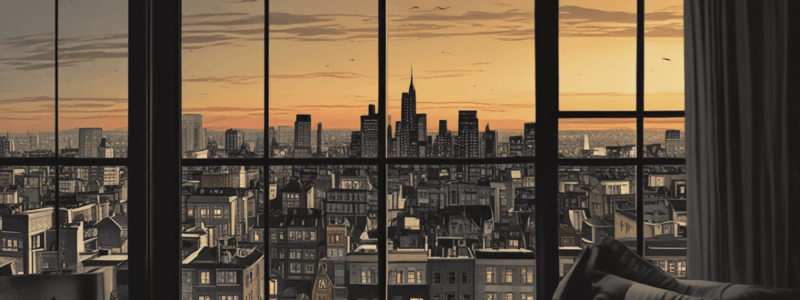Podcast
Questions and Answers
How does the audience relate to Jeffries in Rear Window?
How does the audience relate to Jeffries in Rear Window?
- The audience empathizes with Lisa's perspective
- The audience identifies with Jeffries' gaze (correct)
- The audience is disconnected from the narrative
- The audience remains neutral
According to Laura Mulvey, what is the significance of Lisa's transformation in the narrative?
According to Laura Mulvey, what is the significance of Lisa's transformation in the narrative?
- It emphasizes Lisa's active role
- It highlights Jeffries' passive role
- It has no significance in the narrative
- It rekindles Jeffries' erotic interest (correct)
What is the primary narrative technique used in Rear Window?
What is the primary narrative technique used in Rear Window?
- Third-person narration
- Subjective camera (correct)
- Stream-of-consciousness narrative
- Objective camera
What is the primary function of the male protagonist's gaze in Rear Window?
What is the primary function of the male protagonist's gaze in Rear Window?
Study Notes
Scopophilia and Voyeurism in Cinema
- Rear Window exemplifies scopophilia, emphasizing pleasure derived from looking as a core narrative element.
- Protagonist Jeffries represents the voyeur, observing neighbors through his apartment window.
Active/Male and Passive/Female Dynamic
- Jeffries initially perceives Lisa as a passive figure lacking sexual allure.
- Lisa evolves from a visual spectacle to an active narrative participant, reigniting Jeffries’ interest.
Identification and the Male Gaze
- Audience aligns with Jeffries, sharing in his voyeuristic views and experiences.
- This identification implicates spectators in Jeffries’ gaze, fostering complicity in his observation.
Woman as Image, Man as Bearer of the Look
- Lisa's exhibitionism is highlighted by her keen sense of fashion and visual perfection.
- Jeffries’ voyeurism stems from his role as a photojournalist, merging storytelling with visual capture.
Contradictions and Tensions in the Male Gaze
- Jeffries’ combined roles as a photojournalist and spectator emphasize contrasts between active observation and passive viewing.
- The film navigates control dynamics, with Jeffries’ eventual rescue of Lisa showcasing his reasserted active role.
Hitchcock's Exploration of Voyeurism
- In Vertigo, subjective camera work mirrors Scottie’s perspective, centering the narrative around his viewpoints.
- Scottie’s overt voyeurism manifests through his obsessive following of a woman he admires from a distance.
Sadistic and Fetishistic Elements
- Scottie’s obsession leads to tragic outcomes, revealing themes of control and objectification in male gaze.
- He reconstructs Judy to fit his idealized image of Madeleine, illustrating a desire for domination over feminine identity.
Gender Dynamics and Power Structures
- Male protagonists in Hitchcock’s works often embody authority (e.g., policeman, wealthy male), yet their desires propel them into morally ambiguous situations.
- Women serve as objects of desire and scrutiny, with narratives suggesting underlying tensions regarding power and legal authority.
Identification and Spectatorial Experience
- Hitchcock's films employ identification techniques, immersing audiences in male protagonists' voyeuristic experiences.
- Spectators become part of the voyeuristic continuum, reflecting their own desires within cinematic narratives.
Douchet's Metaphor of the Cinema
- Analysis of Rear Window positions Jeffries as a surrogate for the audience; apartment events parallel the film experience.
- Lisa's transition from passive observer to an erotic figure rejuvenates their dynamic, shifting the nature of his gaze.
Studying That Suits You
Use AI to generate personalized quizzes and flashcards to suit your learning preferences.
Related Documents
Description
Explore the concepts of scopophilia and voyeurism in cinema, specifically in Hitchcock's Rear Window, and how they relate to the male gaze and the objectification of women.




